Science: We are biologists.
In our first science unit, we are biologists. Biology is the study of living things. Year 6 will be learning about living things and their habitats. The children learnt that both animals and plants are organisms but they have a different criteria to fulfil to be classified as either.
Animals have 6 criteria for life.
- breathe
- move
- eat
- grow
- excrete (poo)
- reproduce
Plants have 4 criteria for life.
- move (towards sunlight)
- make its own food
- grow
- reproduce
Year 6 looked at the enquiry question ‘How can we identify, group and classify plants, animals and microorganisms?’. To help us with this learning, we played ‘Guess Who?’. The children could classify these people according to their common observable characteristics. We can also identify them due to their common observable characteristics.
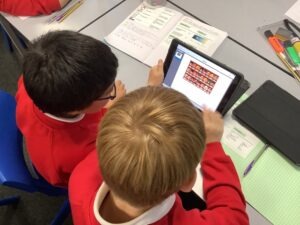
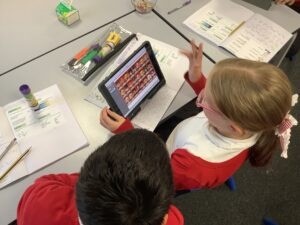
They then used this knowledge to identify the common observable characteristics of each species of animal.
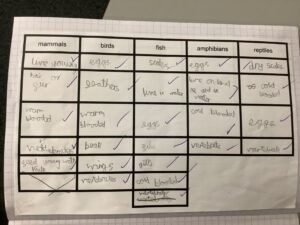
Help at home: Discuss the key vocabulary for this science unit. Can you use these words in sentences?

Autumn term after-school clubs – places available
As we start week two of our new after-school club schedule, there are some clubs with spaces available and it is not too late for your child to join a club.
Monday
- Y3/4 Table tennis 1 space
- Y3-6 Chess spaces
- Y4-6 Dodgeball 1 space
Tuesday
- Y1-3 Foot-tech football 1 space
- Y1-3 City of Leeds Basketball spaces
- Y5-6 now open to Year 4 Table tennis spaces
Wednesday
- Y1-3 Fun and games spaces
- Y4-6 City of Leeds Basketball spaces
Thursday
- Y5/6 Coding 2 spaces
- Y5-6 now open to Year 4 Netball spaces
PE: OAA
This half term’s PE units are OAA (outdoor adventurous activities) and Football. This week, in OAA, the children have used their amazing teamwork skills to communicate with peers.
For part of this lesson, each group needed to create their own game using only hoops. They used well-known games as the basis of their own, for example, Hot Potato, What’s the time Mr wolf? and Hoopla.
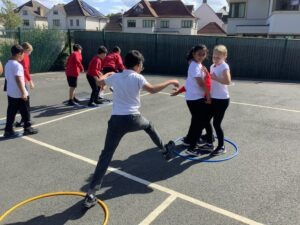
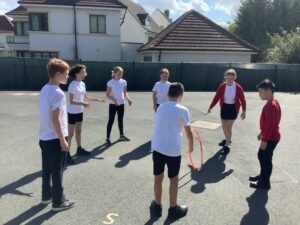
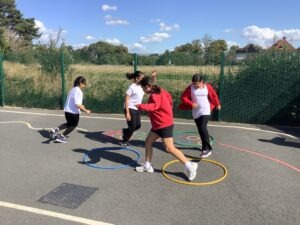
Help at home: When else can we use our teamwork skills?
Living and Learning: Eight Rs for Learning
This week our L&L statement was ‘I use the eight Rs to help me learn.’ We started off by recapping the 8Rs and then looked at each one in detail and discussed different statements that match the 8Rs.
- reflecting – I look for feedback from my teachers and peers and think about how I can use this to improve.
- remembering – I find links between what I am learning and what I already know.
- resilient – I stick at things even when they are difficult and do not give up; I stay positive.
- resourceful – I know where to find information and use it in my work (word walls, support sheet etc.).
- responsible – I am respectful with everything (presentation, resources etc.).
- risk-taking – I can ask questions and give my opinion in a group/class situation.
- responsive – I can respond appropriately to peers and adults.
- ready – I always want to learn new things.
“I think I am good at being resourceful as I can look around at the classroom displays to help me with my work.”
“I need to improve on (safe) risk-taking as I only put my hand up for an answer I am 100% sure on.”
“I need to work on remembering as I forget a lot of things – I could do this by saying it in my head multiple times.”
“I think I’m good at being responsible as I play with younger children in the playground at break and lunch times.”
“I think I’m good at reflecting because when I’m done with my work I look back at the tasks to see what I’ve completed and how I felt when doing them.”
“I think I’m responsible because I listen to instructions.”
Help at Home: Discuss with your child which 8R for learning they feel confident in and which they feel like they need to improve.
Spelling
This week in our spelling sessions, we have looked at homophones. Homophones are words that have the same pronunciation but different meanings, origins, or spelling, for example new and knew.
The children practised these words by using the activity ‘doodle words’.
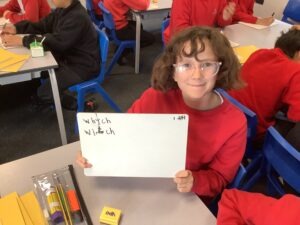
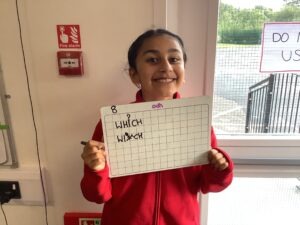
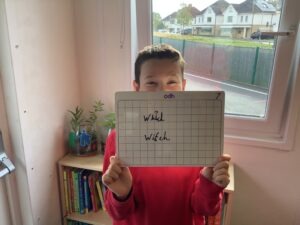
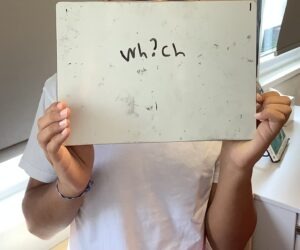
Help at home: You can find other activities to help practise spellings at home in our Super Spelling Strategies Guide on the school website.
Living and Learning: Rules
In Living and Learning this week, we looked at the school rules and why they are important. We had a discussion where children were able to share their opinion on which rule they thought was the most important.
“I think being safe is the most important because if we aren’t making safe choices we can’t follow the other rules either.”
“I think all three are equally important. They make sure we are happy and healthy in school.”
We then discussed how we can show the rules are being followed in school. For example, we can show we are respectful by using our manners or we can show we are ready by having eyes on the speaker.

We also discussed our school’s Acceptable Use Agreement for their use of the internet in school. This document has been sent home with your child this week; please sign and return them ASAP.
Help at home: Discuss what rules you have at home and compare them with the school’s rules. Are they similar? Are they different?
Welcome!
Welcome back after the summer holiday. We hope you had a happy and healthy summer. It has been great to see so many happy faces back in school. The children have settled really well in their first week and are adapting to new routines and classrooms.
This week, we will send the children home with a reading book and a new reading record book. It is really beneficial that your child reads at home daily – it improves fluency and increases the enjoyment of reading. The children can record what they’ve read at home in the reading records. We will also set a task for them to complete at home. Please ask your child what their task is for their homework and actively encourage them to think about the presentation of their work in the journals and the importance of neat handwriting and accurate use of punctuation.
Thank you to all the children who have come to school in the correct uniform and PE kits this week. If you are unsure of the uniform, please click the link to see what is required.
Important Dates
PE – Monday and Thursday
Spelling test – Friday
Library – Tuesday
We are looking forward to a successful year!
Moortown Oscars 2025
Thank you so much for a fantastic year. We wrapped it up in style with a great party last night. Awards were given, dances were performed and songs were screamed!
We wish every child the very best for their future and we know they’ll go on to do great things.
Moortown will miss them dearly.
Miss Wilson, Mrs Charlesworth and Miss Kidd
x





























DT: Eggy crash tests
The time has come to see whether our cracking karts will protect Eggy or see him scrambled!
Our teamwork has been eggcellent but now our brains are fried. Good luck, Eggy. We hope our engineering has been no yolk.









Did every Eggy survive?










DT: Eggy Karts
Y6 have been busy working on their Eggy Karts.
We are following a design criteria:
- sturdy
- durable
- mobile
- protects Eggy
- aesthetically pleasing
We’ve used saws, clamps, bench hooks and glue. Later in the week, we’ll test them to see if they really do protect Eggy from getting scrambled.
Help at home by asking how your child stayed safe in these lessons.







They look great so far!


